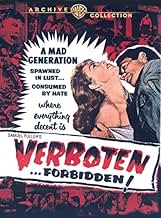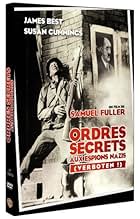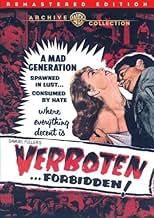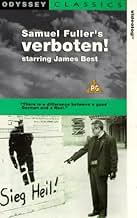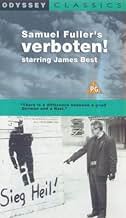A young American serviceman stationed in Germany after the fall of the Third Reich jeopardizes his position with the Marshall Plan relief effort by breaking the non-fraternization rule and f... Read allA young American serviceman stationed in Germany after the fall of the Third Reich jeopardizes his position with the Marshall Plan relief effort by breaking the non-fraternization rule and falling in love with a young German woman. He uses his position to obtain food and luxuries... Read allA young American serviceman stationed in Germany after the fall of the Third Reich jeopardizes his position with the Marshall Plan relief effort by breaking the non-fraternization rule and falling in love with a young German woman. He uses his position to obtain food and luxuries for her that are in short supply, and all seems to be going well for the couple. What he ... Read all
- Infantryman
- (as Joseph Turkel)
- Self
- (archive footage)
- (uncredited)
- Self
- (archive footage)
- (uncredited)
- Self
- (archive footage)
- (uncredited)
- Self
- (archive footage)
- (uncredited)
- Director
- Writer
- All cast & crew
- Production, box office & more at IMDbPro
Storyline
Did you know
- TriviaThis was the last RKO project which began with the original radio-transmitter logo. Later movies from the revived RKO Pictures would start with a modern reproduction of the transmitter.
- ConnectionsFeatured in The Typewriter, the Rifle & the Movie Camera (1996)
It might lead one to believe that this will be a somewhat conventional WW2 flick (somewhat in that one usually wouldn't find Beethoven and, later on to an extent, Wagner put into these images), but this isn't the case. Instead, Fuller makes this a 'Coming Home' kind of movie, though not at all in the sense that 'this soldier comes home injured and so on and so on'. Instead of really going home, Brent stays on in Germany, as he's fallen head over heels for the woman, Helga (Susan Cummings, pretty good at pulling off the German accent), and wants to work in a smaller capacity in the military so he can marry her. What he doesn't realize is that a) she wants him more for money so she can get food for herself and brother, however this gets complex emotionally at the point of revelation to the slightly naive but heartfelt Brent, and b) there's an underground Hitler youth sect called the Werewolves, who want to pick right up off where Hitler ended- starting small, despite argument within the group- by attacking the very government that's now embedded in Germany to give them, as Brent describes, a "blood transfusion."
With this, plus footage from the Nuremburg trials, and (as narrated, I think, by Fuller himself) a quick, no-punches-pulled history of the Nazi war crimes piece by piece, we get a multi-faceted look at a society in the dire straits of an immediate post-war environment. While Rossellini handled it his own way with Germany Year Zero, Fuller tackles it with layers: first there's the love story, or what is the tragic downfall of a man who can't see anything past what he thinks should be reasonable, that it's his wife and a child on the way that he can't leave, until the revelation that he's (partly) been swindled. Baker and Cummings, along with Harold Daye as Helga's young, confused brother, perform at with the utmost detail to emotions; these aren't very easy B-movie parts, though they could've been that. Then another layer is the political one, the struggle of a society to come to grips with being conquered, and a mentality which is made sensationalized, to be sure, by Fuller, in respect to making the Nazi's a total no-gray-area thing: they're evil, particularly when they cancel out reason to meet their ends.
And finally there's the layer of style, which is strangely absorbing. This is probably one of Fuller's 'talkiest' films, which isn't a bad thing considering it's one of his best written scripts, as the characters don't talk simply or in too many platitudes (with the exception of a small scene where two characters talk about the Hitler youth as juvenile delinquents, which is actually, according to Fuller's autobiography, probably another layer to consider in the subtext and the 50s period of movies). And Fuller shoots this almost in a real European style, when he's not going for fight scenes or battles, as the editing isn't always very fast, and sometimes a cut won't happen for a full minute, or longer.
There's an odd tension that grows out of this, especially when there's something said by a character that gets another one wild-eyed or suspicious; Fuller could easily go for a big close-up, but there's a more sinister, cold quality to not moving away from two people in a conversation without a simple over-the-shoulder deal. But when it requires it, like the big brawl outside the American military office, or the Nuremburg footage spliced into Franz's memories of the Werewolves, Fuller can be as stunning stylist as ever.
Very hard to find, but extremely worth it if you'r either a fan of the director's or of WW2 movies set in Germany- or even just a history-buff- Verboten! is an intellectual experience and a strong emotional one, with a cast that is better than expected from a B-movie, and an attitude towards the 'other' that is equally damning and thought provoking.
- Quinoa1984
- Sep 28, 2007
- Permalink
- How long is Verboten!?Powered by Alexa
Details
- Runtime1 hour 33 minutes
- Color
- Aspect ratio
- 1.85 : 1
Contribute to this page


